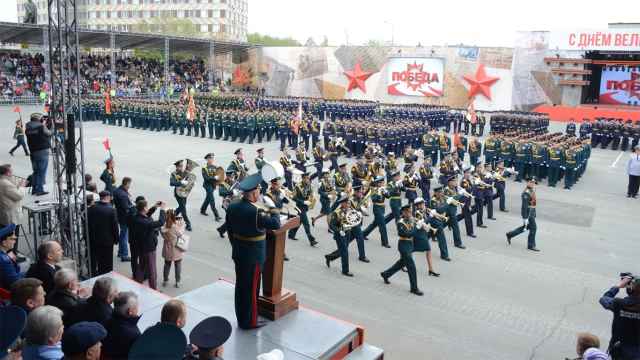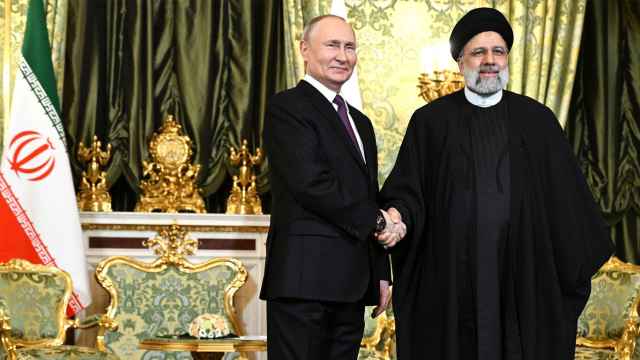A relatively small business deal, VTB's purchase of Swedish-owned mobile phone company Tele2 tells us a lot about the state of the Russian stock market.
By mid-April, the U.S. S&P 500 was up by 12 percent. By contrast, Russia's RTS was down by 12 percent. That is a big difference. Economic growth is often a cause of stock market moves, but both economies are expected to grow similarly at 2 percent or 3 percent this year. Financially, Russia looks much better than the U.S., but this is not helping its stock market.
Five years ago, the Brazilian and Russian stock exchanges had similar value. Although they have a similar industrial composition, the Russian stock exchange has a market capitalization that is less than half of the Brazilian stock market, and the Russian stock market is only going down.
Many factors matter, such as the predominance of lowly valued commodity companies in Russia, its poor rule of law, and its lawless rule of siloviki, but the key issue is probably the poor and ever worsening corporate governance. Although the Russian government talks about turning Moscow into a global financial center, it is making sure that will not happen.
One of Russia's most fundamental corporate governance problems is that the freedom of sale and purchase of big enterprises no longer exists. The actual rules are not easing up but becoming increasingly rigid.
First, if a state corporation wants to buy a Russian company, it has priority. The only permissible competition is from other state companies.
Second, yet even more favored, are President Vladimir Putin's friends from the Ozero dacha cooperative. All too often, they are invited to buy at a low price what state corporations have acquired at a higher price. Opposition leaders Boris Nemtsov and Vladimir Milov have detailed many of these transactions with Gazprom.
Third, as British writer George Orwell pointed out in his novel "The Animal Farm," some pigs are more equal than others. The old oligarchs still enjoy some privileges. Even if they are not as great as those of the state corporations or the Ozero collective, they are entitled to buy smaller private companies.
The situation is quickly getting worse. Recently, a number of oligarchs have ended up with large amounts of cash, but they are being informed that they are no longer allowed to buy any substantial companies for their money. The big and attractive properties are reserved for the Ozero collective and state corporations.
So what can a decent oligarch do with his cash? He can only take it out of the country. But if he does so, he will be attacked for being "unpatriotic" amid Putin's campaign against Russians taking their assets offshore. Naturally, this dilemma stimulates the payments of money to charity, which usually means to the Kremlin.
Russia has many impressive entrepreneurs, most of whom seem to be in their 30s. When you talk to them, most seem to harbor the dream of retiring at the age of 40. If they are rich enough, they will go to London. Otherwise, they may opt for the Baltic states or Finland. Still, they all tell you that they had better get out of their company and Russia before they hit the glass ceiling when they will have to sell. Yevgeny Chichvarkin, former CEO of Yevroset, is the nightmare and lesson of all. He was forced to sell his company at a deep discount and leave the country in 48 hours. Russian entrepreneurs know all too well that property rights are conditional in Russia.
The recent Tele2 sale illustrates the situation. Tele2 is an outstanding entrepreneurial company that seems to be able to make it in most business environment, but the Russian environment was just too tough, which is an important lesson for foreign investors in Russia.
After becoming the fourth-largest mobile phone company in Russia, Tele2 was refused a 4G license, which was only given to the three big phone companies — MTS, Megafon and VimpelCom — and a couple of minor companies that were only well-connected. After that verdict, Tele2 had no choice but to sell as fast as possible.
Meanwhile, there was an entire string of strange events. First, it was announced that VTB, the country's second-biggest state bank, had bought Tele2 at a somewhat low price. Next, Alfa Group, VimpelCom, and MTS all offered higher prices, but apparently the deal was already done. Even without any inside information, the situation is all too obvious. As many companies before them, Tele2 was in jeopardy and wanted to sell. It was presumably told that it could only sell to a state company and found VTB most acceptable.
Given that VTB is a bank and not a mobile phone company, the presumption was that VTB acted on behalf of somebody else. Rostelecom, the old, lingering state wireline company, is still alive. Since Rostelecom is state-owned, it might expand as a mobile phone company. Alternatively, media reports have suggested that Arkady Rotenberg, one of the pre-eminent members of the Ozero cooperative, is supposed to be the ultimate owner, although he has denied this.
The lesson to the stock market is that private purchases of a company — even one with a market value of only $4 billion — cannot be sold to anybody but the state. This inevitably puts a ceiling on stock prices. As the dominance of the Ozero cooperative and the state corporations becomes greater, stock prices are likely to be capped regardless of economic development.
The Tele2 story was particularly disturbing because both Mikhail Fridman, chairman of Alfa Group, and Vladimir Yevtushenkov, chairman of Sistema, tried to get into the game and failed. These two men are among the most powerful, well-connected and wealthiest oligarchs. If even they can't get into the market, we are talking about quite a closed market.
The old saw runs that the Russian stock market is perfectly correlated to the oil market, but that has not been quite true for the last several months. While the oil price index has fallen by 5 percent in the last three months, the RTS has dropped by 10 percent, doing considerably worse than oil. It is easy to understand why.
The simple truth that all stock traders know is that as long as foreign companies are deprived of normal business conditions and forced to sell to state companies, Russian stocks will never be worth much.
Anders Aslund is a senior fellow at the Peterson Institute for International Economics and author of "Russia's Capitalist Revolution."






